Trauma Denial: Why It Can Help and Hurt Your Healing

In this article
Sometimes things are just too heavy to think about.
Following a traumatic event, it isn’t unusual for people to want to avoid thinking about it, much less deal with it. We, as humans, want to avoid pain, be it physical or emotional. Recalling what happened can bring up memories and even sensations that are painful and, sometimes, even scary.
You might think that avoiding stirring up all those feelings is a good thing. And, in the short term, you wouldn’t be wrong. In fact, denial can be both helpful and hurtful.
To be fair, not all trauma results in long-term problems. Some people are able to recover and move forward. However, for many people who have experienced major trauma, moving forward is difficult. Moving forward seems as scary as staying where you are. Unresolved trauma can lead to significant problems in functioning and maintaining well-being.
What is trauma?
Trauma is an emotional response to experiencing or witnessing a distressing event. When you think of trauma, you probably think about catastrophic or life-threatening experiences like assault, combat, or catastrophic events. These experiences are sometimes referred to as “big T” traumas.
These types of experiences are often linked to PTSD, and what most people recognize as trauma.
Experiences linked to “big T” trauma might include:
- Childhood abuse or severe neglect
- Physical or sexual assault
- Serious accidents (ex., plane crashes, serious car accidents)
- Witnessing or experiencing domestic violence
- Natural disasters
- Combat or living in a war zone
- Witnessing serious injury or a death
- Near-death experiences (ex., life-threatening illness)
What you might not realize is that trauma can also come from experiences that are not as obviously traumatic. These experiences are often referred to as “little t” traumas but make no mistake, there’s nothing “little” about them. These “little t” traumas can be just as devastating and impactful.
Because they don’t fit the popular idea of what trauma is, they can get minimized or even overlooked.
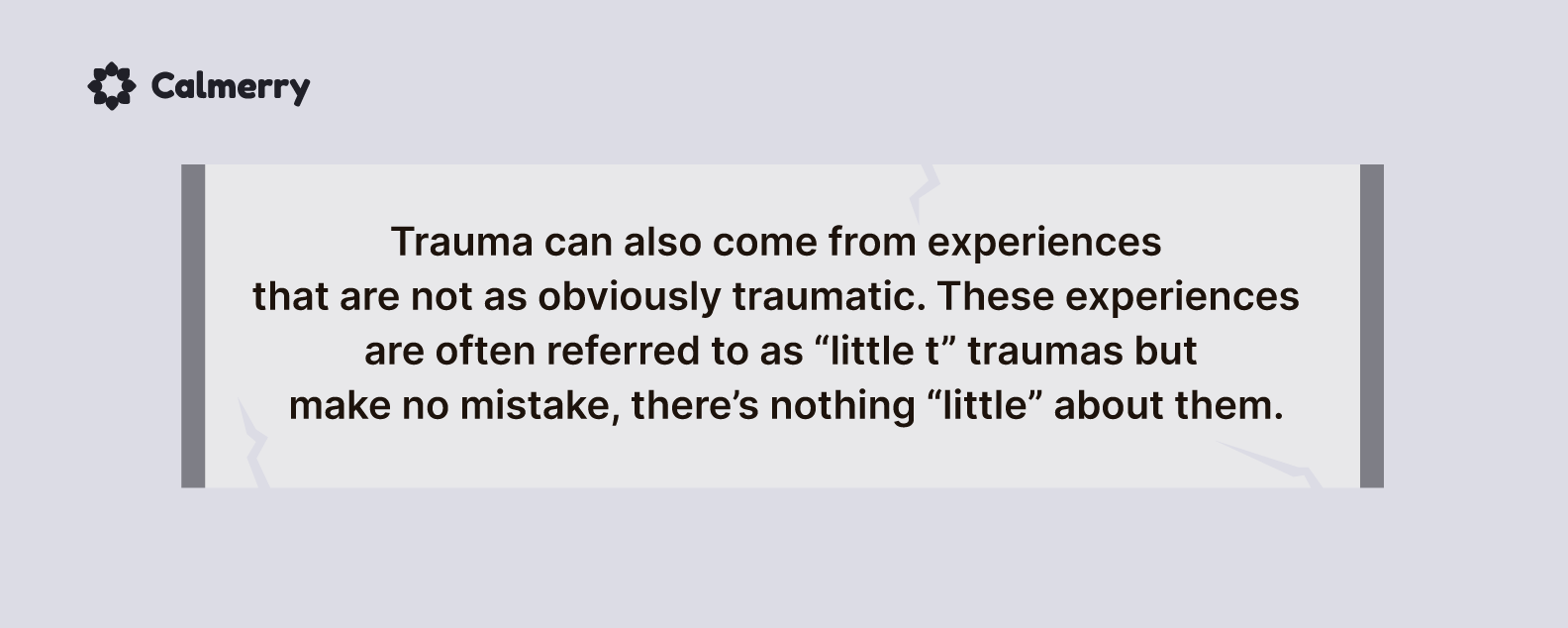
“Little t” traumas are those smaller, more personal experiences that create significant stress and exceed the person’s ability to cope with their experience. They’re the kind of events that are usually not life-threatening but more life-disrupting or life-altering to the degree that is emotionally disruptive.
Some examples of “little t” traumas might include:
- A sudden, unexpected, or stressful move
- Job lay-off or change
- Bullying
- Complicated or unexpected divorce or breakup
- Severe illness
Some statistics on trauma prevalence
Trauma is more common than you might think. In fact, it is estimated that about 6 of every 10 men and 5 of every 10 women will experience at least one trauma.
Women are more likely to experience sexual assault and child sexual abuse. Men are more likely to experience accidents, physical assault, combat, disaster, or witness a serious injury or death.
While men tend to experience more trauma, women are at a much higher risk of developing PTSD.
What is trauma response?
After experiencing a trauma, the effects might be immediate and highly visible – flashbacks, changes in mood, hypervigilance, and problems sleeping.
Other effects may be more subtle and emerge over time – difficulty functioning at home or at work, isolating yourself from others, and avoiding certain situations. These can all be a response to trauma.
Trauma has a way of convincing us that talking about it is somehow not ok. Talking about what happened is difficult. You may feel alone, and that others couldn’t understand. You may feel embarrassed to speak about it. You push it down, suppress it, and press on. Why stir up all those painful memories?
Just what іs denial in trauma?
Trauma denial is a short-term response that can sometimes create long-term problems. Avoiding dealing with your trauma can affect not just your physical and emotional well-being but also your ability to manage your world and your relationships with others.
When trauma occurs, the brain goes into what you might think of as survival mode, kind of like our primal “fight or flight” response. It’s your brain’s job to protect you. When trauma occurs, that survival instinct kicks in, and your brain chooses the path of greatest protection. Sometimes, that protection takes the form of denial.

Denial is more than just saying, “It didn’t happen.” Trauma denial is a defense mechanism that allows you to bury, suppress, and avoid dealing with what happened. You also may adopt emotional avoidance behaviors that help you to avoid anything that evokes unpleasant feelings.
Can trauma denial be helpful?
In the short term, denial can actually be helpful. It acts as a protective barrier. Memories and emotions are suppressed. You have time and space to understand what happened. It’s your brain’s way of protecting you until you’re in a more stable emotional space and ready to work through the trauma.
Now, not everyone who experiences trauma, even a Big T, will have ongoing issues or require professional services. There are some people who, for reasons not completely understood, seem to have greater resilience and are able to move on from trauma more easily.
There’s research to suggest that in some circumstances, people who minimize or deny their traumatic experiences have a strong self-serving bias that seems to help protect them from developing other mental health issues.
Some trauma survivors experience a phenomenon known as post-traumatic growth, where they are able to find positives in what happened to them and experience a new appreciation for life, gratitude, and more engagement with loved ones.
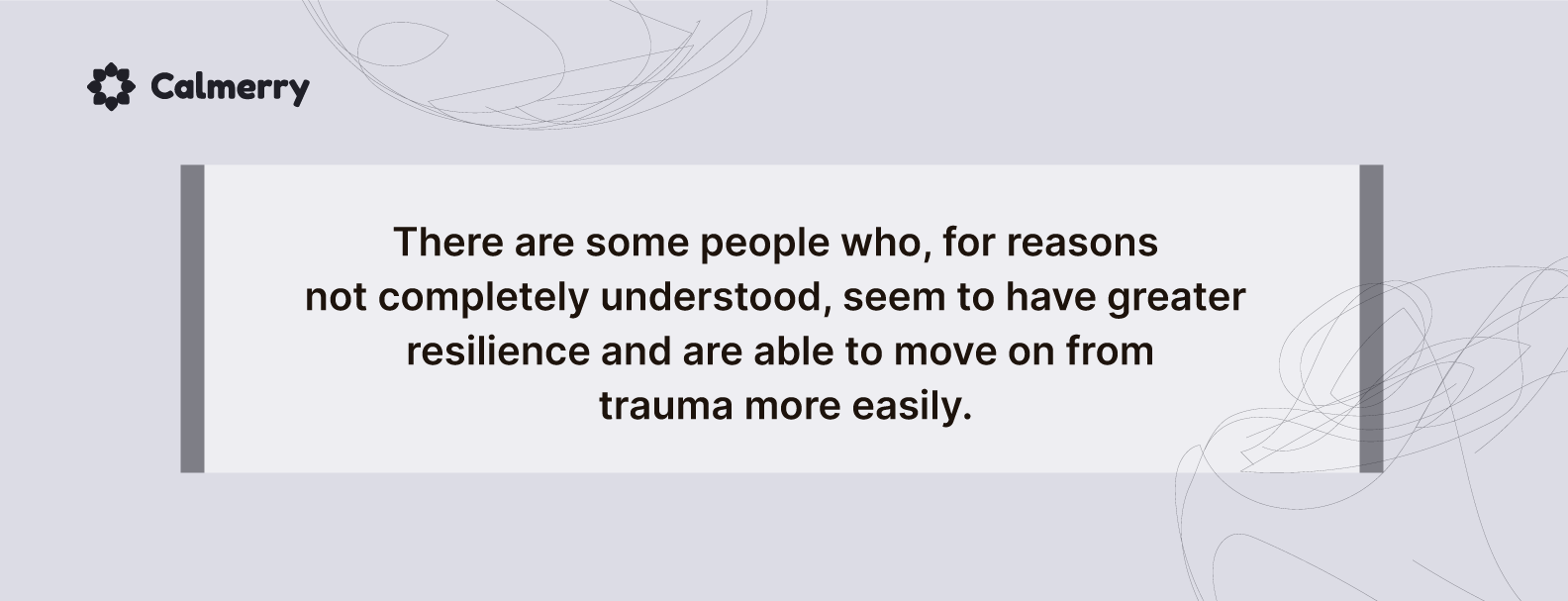
You might think that talking about your trauma right away is the way to go. Well, that’s not exactly true, either.
In fact, denial can be helpful, especially in the early days after experiencing a trauma. Denial, in the short term, is thought to give the brain time to absorb and process what’s happened and prepare for what comes next.
So, if denial can be a good thing, why confront it?
Why not just leave it alone?
Not everyone has the same resilience or coping resources. For some people, moving past their experience is more challenging.
When the effects of trauma go unaddressed, they can begin to erode your quality of life. Relationships suffer. Your ability to function in the world suffers. Your mental health suffers. Unresolved trauma can even affect your physical health. The effects of the trauma you experienced can intrude into your life, affecting your relationships, work, or daily functioning.
A few of the many ways trauma denial can manifest include:
- Avoidance of people or situations that remind you of the event
- Changing the subject or diverting attention to avoid talking about it
- Keeping extra busy with work, friends, etc.
- Misusing substances to avoid or dull the emotional distress
- Minimizing what happened (e.g., “I’m fine.”)
- Emotional numbness
Making the decision to address your trauma is not an easy one. There is no timeline or definitive marker. Everyone comes to that place in their own time.
If your distress is causing problems with your relationships, work or school, or handling your day-to-day activities, it might be an opportunity to seek help.
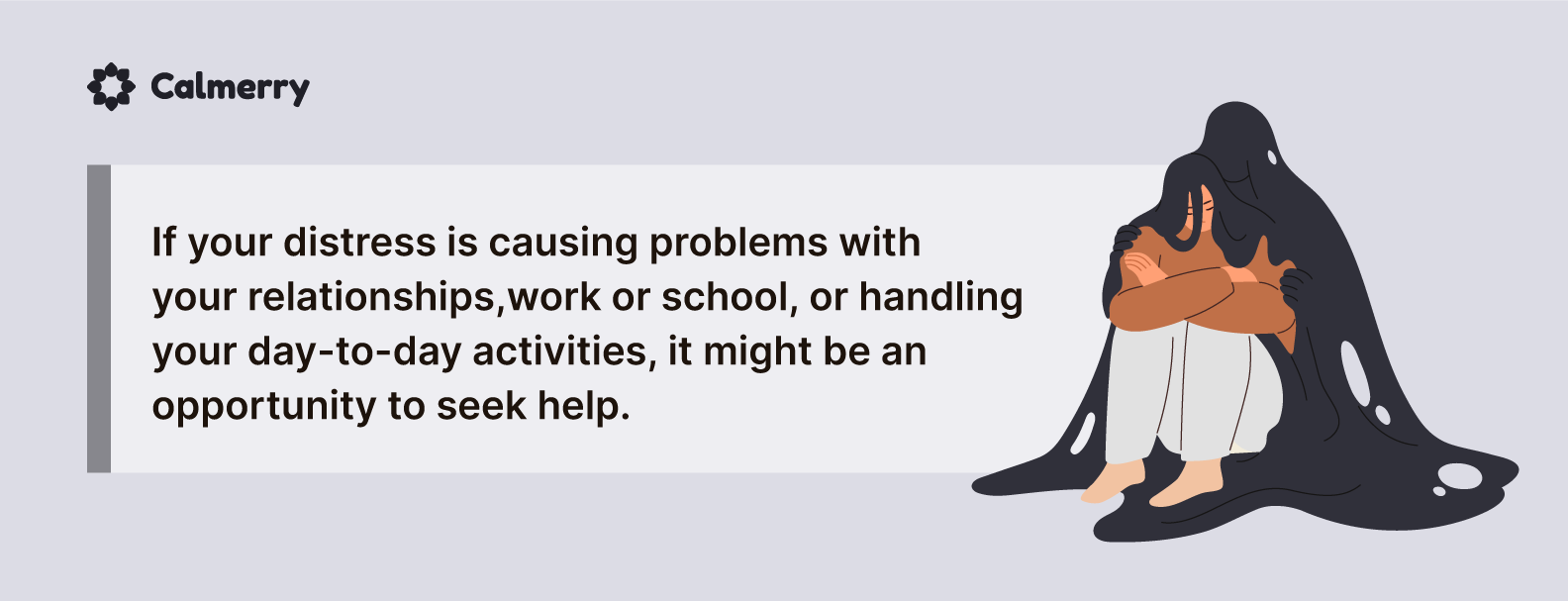
How to resolve trauma
There is no “one way” to resolve trauma. Your journey will look different from another person’s journey, and that’s OK. The idea of dealing with your trauma can feel daunting. Healing is possible, and many describe it as a weight lifting off their shoulders.
When that time for help comes, and the healing path you choose is a very personal choice. You have options.
Therapy
For many people, therapy can help to work through trauma and find a place of healing. In fact, therapy is one of the most widely used approaches to treating trauma. Not just any therapy, but trauma-focused therapy with a therapist who understands and knows how to resolve trauma.
You might be thinking, “But I talked about it already.”
You probably did talk about it at some point. And it was probably painful and uncomfortable. Having to talk about the experience again (and again) is one of the main reasons why people avoid therapy. We don’t want to experience discomfort anymore than we have to. We are a resourceful species and quickly learn “workarounds” or ways of avoiding what hurts us.
But talking about it and healing are not always the same thing.
Even if you’ve sought help in the past, aspects of unresolved trauma can resurface. Or those aspects that were never really addressed can emerge. It doesn’t mean therapy didn’t help. Healing trauma is a process, and healing is not linear. Sometimes we heal in steps, but we can and do heal.
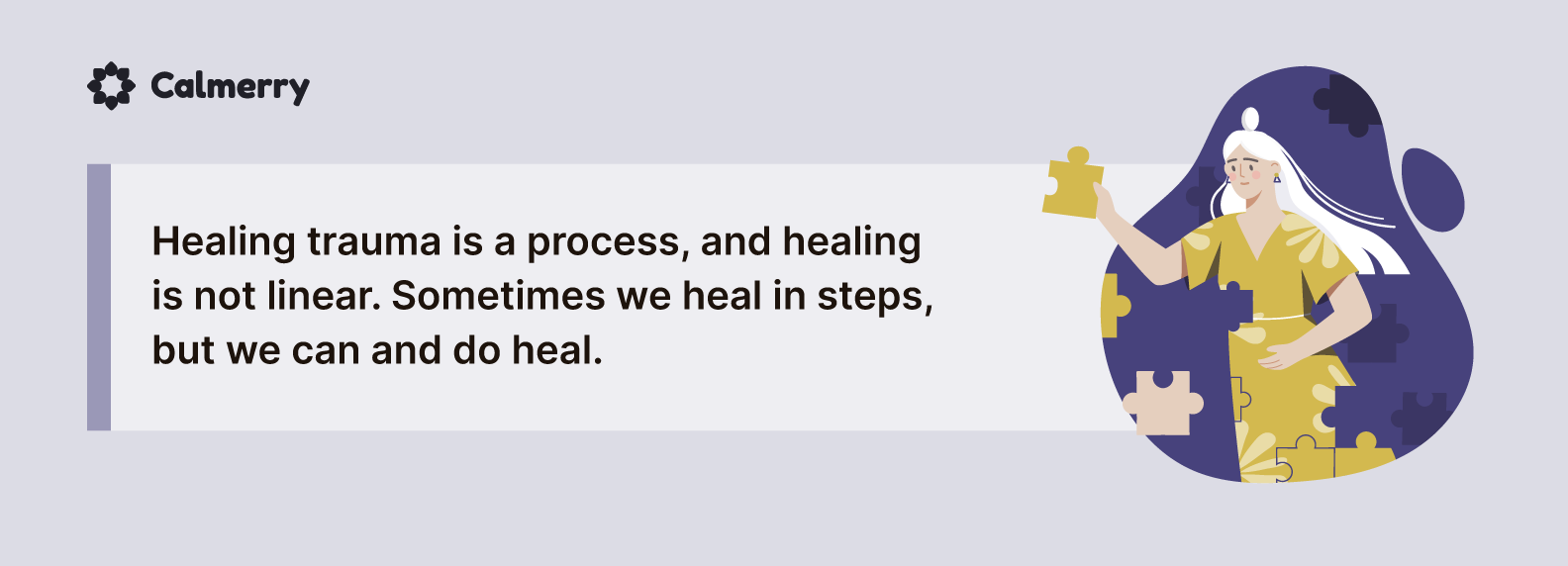
A trauma professional can help you sort through your experience and find your path to healing. There are therapists who are specially trained in various approaches to trauma care.
Not every approach to trauma care requires in-depth “talk therapy,” which is one of the most commonly expressed concerns and reasons for not going to therapy. After all, not everyone wants to retell every detail of their experience, and that’s OK.
Approaches such as Eye Movement Desensitization Reprocessing (EMDR) have been shown to be highly effective in treating trauma and disorders such as PTSD. EMDR and similar approaches are based on the way the brain makes and stores memories, relying less on “talk therapy” and focusing more on distressing symptoms and emotions.
Other approaches to trauma treatment include cognitive processing therapy, exposure therapies, and trauma-focused cognitive behavioral therapy (TF-CBT).
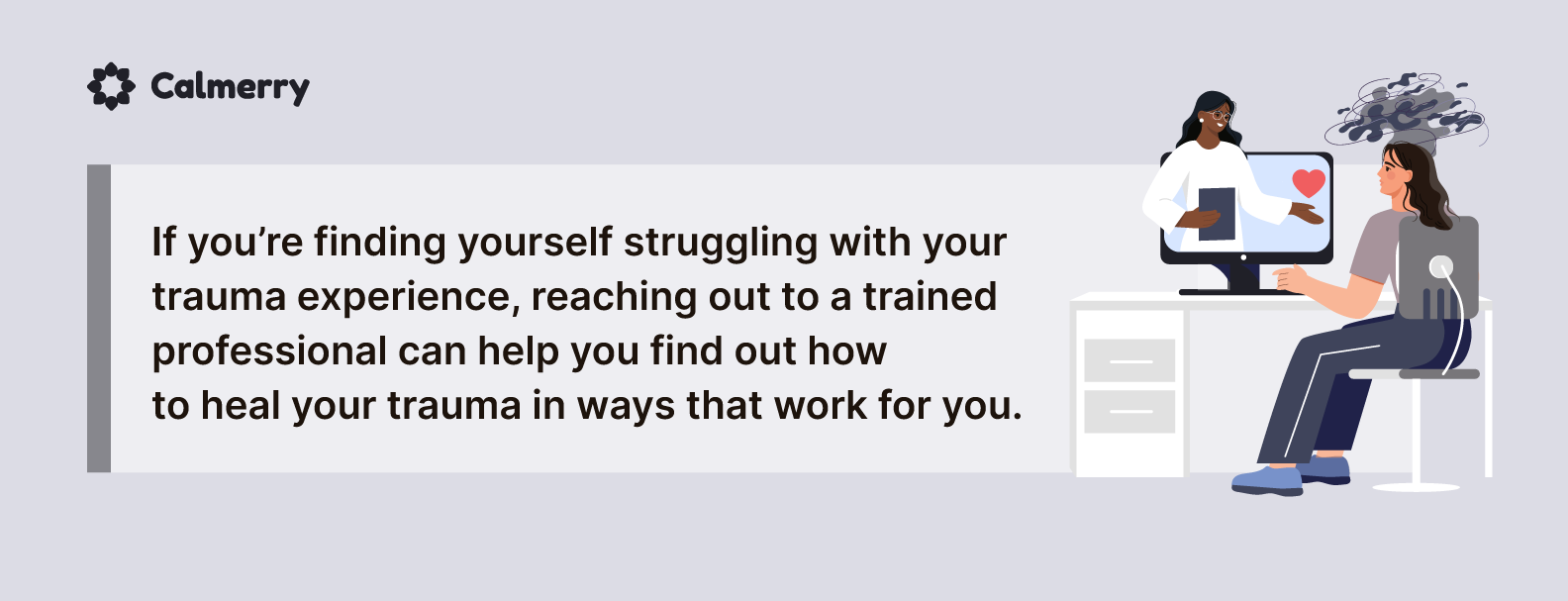
Self-help
Aside from professional support, taking care of yourself is equally as important. Self-help strategies can help you to nurture your body, your mind, and your spirit, all aspects of holistically healing your trauma.
Some self-help strategies to try include:
- Yoga
- Meditation
- Exercise
- Journaling
Of course, you want to work with your therapist to identify the self-help strategies that might be most beneficial for you.
Reach out
If you’re finding yourself struggling with your trauma experience, reaching out to a trained professional can help you find out how to heal your trauma in ways that work for you.
With the rise in access to therapy via online resources, help is more accessible than ever before. Online therapy allows you to access care when and how it makes sense for you. And online therapy has been shown to be as effective as traditional in-person counseling.
When you feel ready, there is help, and there is healing.
online therapy
live video session



